NEMO 2019-1-IT02-KA201-063340 Transnational Project Meetings (TPMs)
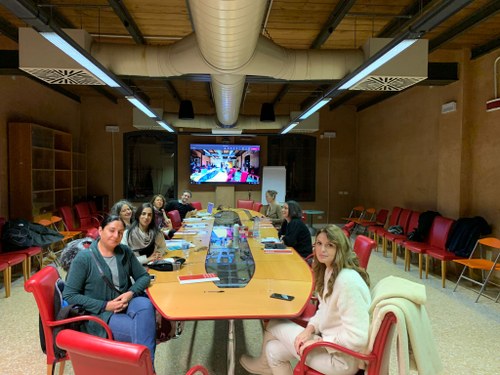
NeMo Final Transnational Project Meeting | 15 - 16 December 2022 | Bologna (IT)
The fifth and final meeting in Bologna - hosted by University of Bologna - provided the opportunity to check the finalisation of the Outputs, collect the feedbacks from the Multiplier Events around Europe and celebrate the final event together. The meeting has been attended by the all the participant organisations, Pedagonski Institut and University of Valencia attended online.
A final check has been conducted on administrative documentation, timesheets, job contracts, dissemination reports, dissemination tools, outputs and
executive summaries local translations, multiplier events documentation, trainings and meetings documentation. The final meeting provided the chance to share the Multiplier Event in Bologna with the NeMo partners who’s been included into the agenda as official speakers.
All the participants received an attendance certificates and evaluated the meeting though related questionnaire.
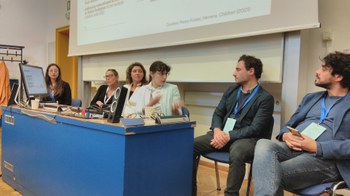
NeMo 4th Transnational Project Meeting | 20 - 21 September 2022 | Ljubljana (SI)
The fourth NeMo project meeting was held in Ljubljana hosted by Pedagoski Institut. All the partner organisations attended the meeting. The meeting was attended by 11 participants (at least one per each organisation). The main aim of the meeting was to assess the final pilots delivered by the partners (IO1 and IO3) as well as the finalisation of the Monitoring systems report (IO2) and Curricula comparative report (IO4). The comparative reports 2 and 4 were reported as on the final stage of their development.
The meeting provided the partnership to focus on the final recommendations developed by the Outputs’ leaders through the effective participation of all the partners. The following topics have been jointly discussed: how to promote continuity in ECEC phases 0-6, establish nationally regulated and guided inspections 0-6, promote development of professional collaborations with support functions for ECEC 0-6, ensure opportunities for further education of core staff, collaboration with families, recommendation for a unified curriculum 0-6. The IO3 final pilots were reported and assessed as follows: Phase 1: Setting the stage During Phase 1, a first evaluation of the functionality of the toolbox was made in a BETA Testing process, with the participation of teachers. The trainings took place online and lasted about 2 hours.
Once the teachers familiarized with the IO3 Toolkit and understood its main functionalities as well as areas of applications, teachers implemented activities using VEVO app with 3-6 years old children. Phase 2: Implementation teachers were given accessed to the tool and at the same time tested the toolkit together in order to familiarize themselves with its functions.
The local pilots have been assessed by the local teachers as fruitful and applicable on diverse settings and tasks in the ECEC scheduling. The meeting has been hosted at the Faculty of Arts of Univerze v Ljubljani where Pedagoski Institut held its Multilier Event making engage the entire partnership with local academics: https://www.pei.si/konferenca-2022/ Each output leader delivered a brief presentation of the main findings and products development in order to disseminate NeMo project and share the benefits of the introduction of new observation methodology and ICT tools for ASD children in ECEC centres. Finally the following features have been deepen and investigated in order to successfully finalise the last part of the project: - Local Multiplier Events – objectives, settings and tips for implementation and reporting - Administrative Checkpoint - Dissemination Final strategies - Final Meeting in Bologna All the participants received an attendance certificates and evaluated the meeting though related questionnaire.
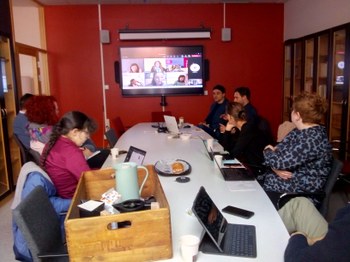
NEMO 3rd Transnational Project Meeting | 7 - 8 April 2022 | Lund (SE)
The Third NeMo project meeting has been held in Lund in the renowned University of Lund. All the partner organisations attended the meeting. The meeting was attended by 12 participants (at least one per each organisation, EUC attended online). The selection of a city close to the one declared at the design phase (Kristianstad) has been led by a twofold aim: (i) the possibility to share the first outcomes of the project within an external University through a dedicated seminar: https://www.sol.lu.se/sol/kalendarium/evenemang /cognitive-semiotics-seminar-semiotic-basis-autism-spectrum-disorders-observation-methodology-nemo/; (ii) the venue allowed an easier connection with the airport facilitating the mobility for the partners. The main aim of the meeting was: Reporting and discussion on IO1 Local Pilots and IO3 Local Pilots, realisation, achievements, feedbacks, comments leading to the next activities as well as O1-A4 and O3-A3 Assessment Reports;
Over the meeting Gruppo Nazionale Nidi Infanzia (IT) Pedagoski Institut (SI) and Kristianstad University (SE) reported the successful experiences that involved local teachers in the experimentation and implementation of local pilots. Nemo’s local pilot has been implemented in various ECEC services in 0-2 yrs centers as well as in some 3-6 yrs preschools, as a training on monitoring practices for teachers even with older children. In both cases Teachers’ participation has been implemented on voluntary base as a single professional or a school team working in ECEC services selected by Gruppo Nazionale Nidi Infanzia, Pedagoski Institut and Kristianstad University. Participation to the project followed four steps: 1) on line training for teachers to familiarise with the NeMo Manual and Tool. Prior to the training they had received a letter informing about the project, the NEMO manual, a database form for the recording of the observation data and an invitation to the training. 2) necessary information for parents of children involved in the observation was provided through a related letter and direct communication. Parents of children involved in the project expressively authorised their partecipation, altough no personal data was collected and sent during the pilot. 3) each teacher produced two/three observations for two children in a two weeks time period and recorded the datas on the online form 4) each teacher answered an online evaluation form to asses their training and observation experience The successful pilots have been assessed through related questionnaires filled out by local teachers, the positive feedbacks and comments have been recorded.
Pilots in Cyprus, Sweden and Spain have been scheduled for the upcoming month. Concerning the IO3 pilots AIAS and Pedagoski reported that the workshop on VIVO app and EDUCEA was implemented on-site, in kindergartens, with preschool teachers who work with children older than 3 years of age. Researchers from the Educational research institute introduced the project, its aims, the NEMO application, its functionalities and its usage (using a Powerpoint presentation and printed handouts). This was followed by a guided practice of developing activities on the app. Each teacher created its own educational activity in the app on the site. All of them used a laptop computer. The training lasted for three hours. The teachers displayed different digital abilities. The teachers liked the possibility of including their own context (i.e., pictures of the kindergarten) in the app.
Teachers involved built activities based on learning the words of a song by using pictures and a speech synthesizer. The Cognitive Conference at Lund University provided the possibility to present NeMo project to academic international audience. The presentation last around 75 minutes and 30 minutes were left for discussion and comments. The project raised a positive interests from academics which work and research in the field of early education. The NeMo methodology has been put in connection with the recommendation on unitary settings 0-6 as well as with further neuro-developmental disorders and how to make ECEC teachers recognise them.
The meeting provided the chance to set the instructions for the following tasks: - O1/A5 training course development - O2/A4 Pre-linguistic methodologies and tools for ASD children integration into the Monitoring Recommendation - O2/A5 Monitoring ECEC System Report - O3/A3 Assessment Report - O3/A4
ICT Toolkit for ASD children development - O4/A2 0-6 Curricula Report A Jointly planning of the firfth action plan has been reached among the partners (April 22 – September 22) As well as a discussion and informal doodle for the 4th TPM in Ljubliana (SI).
All the participants received an attendance certificates and evaluated the meeting though related questionnaire.
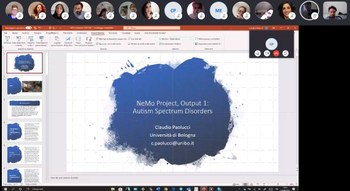
NEMO 2nd Transnational Project Meeting | 1st June 2020
The Second Meeting was attended by the organisations belonging to the partnership in order to update and coordinate the project’s activities and products carried out so far. Due to Covid-19 restrictions and the unstable situation of the flights’ procedures in Europe the meeting was re-scheduled online, keeping the quality foreseen by the application and the objectives’ achievements. The main aim of the meeting was to present the outputs developed so far and how from now on each partner will contribute to the work carried out by the others. Therefore each organisation presented the researches realised and the tasks that each partner will be carrying on over the next months in order to complete and enrich the European level of the outcomes. Output 1: Prof. Paolucci (UniBo) started presenting the childhood observation methodologies related, in particular, to the detection of behavioural, inter-subjective and narrative features attributable to the Autism Spectrum Disorder (ASD). Over the first step of the project co-regulations and misattunements are being analysed trough the collection of videos from the countries involved. All the monitoring procedures will be developed and shared over the Joint Staff Training Event and later tested by implementing the local pilots. The collection, study and test of the methodologies will further shape the learning path for pre-school teachers. Output 2: Hoegskolan Kristianstad and University of Cyprus showed the “European ECEC monitoring framework and tools” on-going work. The main topics arisen are: Monitoring Systems and quality assurance in ECEC/Literature review; Monitoring Systems: Definition and objectives; Overview of ECEC settings Types and standards for comparison; Definitions of ECEC Types of ECEC settings (provisions) and comparative standards; Type of ECEC system in a continuum based on the 4 criteria; Objectives, Terms and Roles of MS; Monitoring Tools and Methods; Types of MS used at ECEC centres; Critique and Comparison The structure looks affordable for the objectives requested. In order to collect all the national features concerning the topic under consideration, a questionnaire will be sent to the partners who will provide the necessary info to complete the European framework of monitoring ECEC. All the partners will have time until October to provide their national outcomes and the Output leading organisation will present the state of the art on the sidelines of the LTTA. Output 3: The methodological toolkit on ICT tools for ASD children has been structured. A wide research of tools and methodologies were achieved by AIAS and Universitat de Valencia in order to face and interpret the state of the art on the subject. Over the next months all partners will locally test which of the tools available are known/exploited by ECEC services, when and how they are used and what impressions/remarks ECEC teachers perceive on the subject considering their daily work. The national context analysis will be achieved through the local delivery of a survey designed by AIAS / Universitat de Valencia and the involvement of ECEC teachers by all the partners in order to collect data at European level. The survey outcomes will later be integrated into the Output 3 Output 4: A broad research on educational guidelines, staff qualification requirements, authorities and life-long learning educational activities for ECEC teachers was achieved by European Research Institut and Gruppo Nazionale who set the main pillars and contents of the 0-6 teachers curricula. The work developed so far foresees the following chapters: Aim of the report Separate & Unitary ECEC settings; Differences Unitary/Splitted; Participating Rate; Accessibility; Education needed for the teachers, staff qualification requirements, Curriculum continuity.
UNIBO FILCOM Department
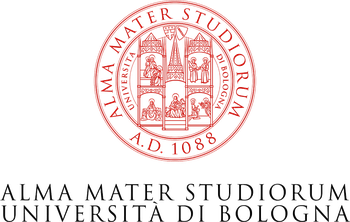
NEMO Kick-off Meeting / 3-4 November 2019
A kick-off meeting was established in order to coordinate the partnership on the tasks and activities to be carried out all along the project life time.
There were 13 participants at the kick-off (at least one from each organization).
The Agenda set an introductory session in order to highlight Objectives, Target groups, Activities, Results, Impact and Timetable. Later, a deep insight has been foreseen for the Outputs activities and three sessions on main core-activities has been set up (Project Management, Dissemination, Quality Assurance).
A wide overview of the project has been illustrated during the meeting, in order to make participants aware of all the activities to be carried out along the project life-time. The overview started with a reflection on different ECEC systems in Europe and how such differences will lead and shape NeMo's outputs.
Output 1. Prof. Paolucci provided an overview on the state-of-the-art concerning ASD diagnosis, with a special attention on the pre-linguistic phase and on the methodology the project will be developing and testing. Partners will be providing over the next meeting information and local requirements about local ECEC services, in order to set the pilot test properly (and on time). The methodology will be developed through the analysis of home videos concerning interactions between caregivers and ASD infants (9-18-month-old).
Output 2. The second Output will be coordinated by EUC and Kristianstad University, in order to achieve the final comparative report between unitary and split ECEC systems. The report will outline the different monitoring frameworks and tools stressing the outcomes coming from best practices in Europe.
Output 3. The third output will provide a unified pedagogical framework for the usage of technical tools addressing ASD children's learning experience. AIAS and University of Valencia will search and collect the best tools and methodologies in order to provide partners the necessary skills to develop the local pilot tests properly, thus improving the inclusive education plans for ECEC teachers and families with ASD children.
Output 4. A comparative report will be designed and realized through the partnership coordination led by Gruppo Nazionale Nidi Infanzia and Pedagonski Institut. The research will further integrate European best practices into a framework proposal taking advantage of the outcomes coming from the methodologies developed in the other Outputs. The main aim is to design a curriculum that combines staff-initiated and child-initiated, in order to sustain children’s active engagement and inclusion within a 0-6 framework. Moreover, recommendations for policy reforms will also be indicated. Partners will provide local ECEC systems framework in order to enhance collaboration among the partnership and maximise the level of detail.
As far as for the first year of the project is concerned, tasks and deadlines for the Outputs realization and implementation have been set up.
Project management issues, financial and administrative rules and provisions, dissemination tasks and quality assurance indicators have been deployed, explained, agreed and established.